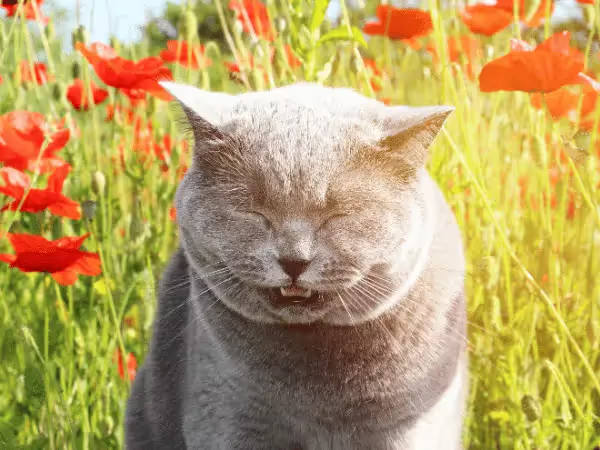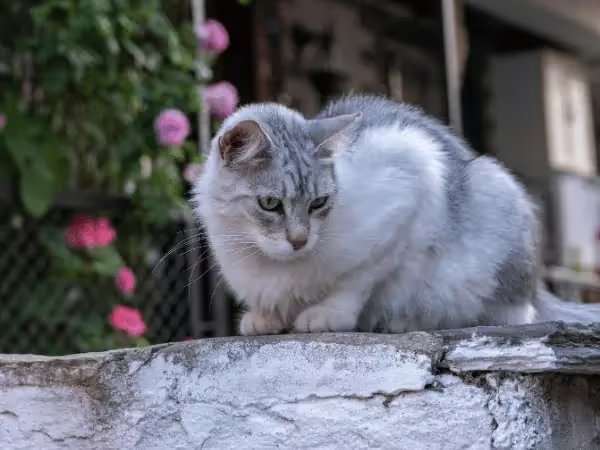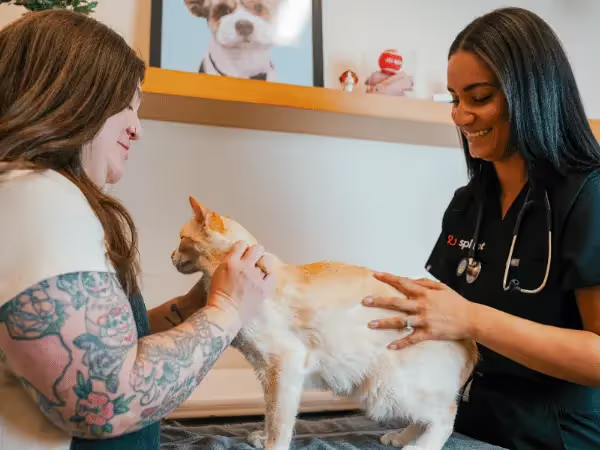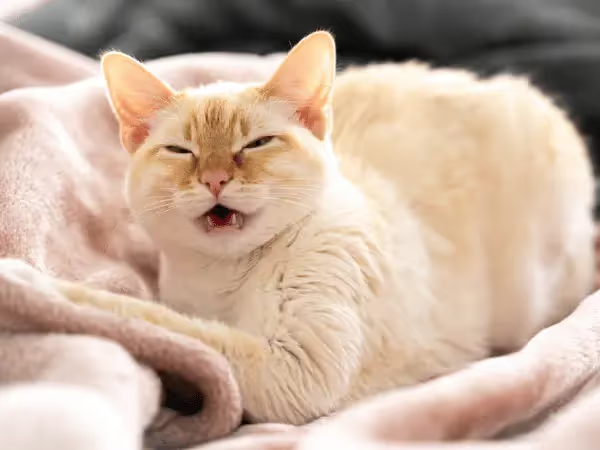Most of the time, a cat’s sneezing is nothing to worry about. However, if you’ve been wondering “why does my cat keep sneezing?” or noticed your cat sneezing a lot, it’s worth understanding what might be going on.
From irritants in the air to underlying medical conditions, sneezing in cats can have many causes. This Sploot Vets guide explores the reasons behind cat sneezing, when to be concerned, and how to help your feline friend get treatment when needed.
Why Does My Cat Keep Sneezing?
There are many reasons why a cat is sneezing; the following are the most common ones:
1. Respiratory Irritants
Dust, smoke, perfumes, or household cleaners can irritate a cat’s nasal passages. When this happens, sneezing acts as the body’s way of clearing the nose of the irritant.
If your cat seems to be irritated by any of the above, move your cat away from the affected area and try ventilating the area before bringing your cat back.
2. Seasonal Allergies in Cats
Though less common than in humans, cats can develop allergies to pollen, mold, or other seasonal triggers. These allergies in cats may cause sneezing, watery eyes, or itchiness.
- Learn more – Signs Your Pet Has Spring Allergies & What to Do Next →
- Learn more – Signs of Fall Allergies in Dogs & Cats & What to Do Next →

3. Upper Respiratory Infections in Cats
Viral or bacterial feline respiratory infections are among the most common reasons behind cats sneezing repeatedly. These infections may also present with other symptoms, such as nasal discharge, eye discharge, or lethargy. If you notice any of these symptoms, reach out to a vet for further evaluation.
4. Foreign Objects in the Nose
A blade of grass, dust particles, or other small objects lodged in the nasal passage can lead to sneezing in cats as the body attempts to expel them. Typically, this is harmless if your cat is able to expel the foreign object, but if your cat is struggling and sneezing repeatedly, we recommend calling a veterinarian to be safe.
5. Feline Immunodeficiency Virus (FIV)
Feline Immunodeficiency Virus (FIV) is a lifelong infection that weakens a cat’s immune system, making them more susceptible to chronic respiratory infections and sneezing due to environmental irritants.
Cats primarily contract FIV through bite wounds from infected cats; however, other, less common transmission routes include mother-to-kitten transmission, close contact, and exposure to contaminated objects. This means that outdoor cats and/or social cats are more likely to contract Feline Immunodeficiency Virus; for these cats, we recommend yearly testing for FIV to get a full picture of their health status.
Note: Most testing kits test for both Feline Immunodeficiency Virus (FIV) and Feline Leukemia Virus (FeLV). For more information on getting your cat tested, reach out to a veterinarian. (This test is available at Sploot Vets.)
Additional Note: FIV status is an important consideration when adopting a new cat. Before bringing a new cat home, especially into a household with FIV-negative cats, ensure that they have been recently tested for FIV.
6. Feline Leukemia Virus (FeLV)
Feline Leukemia Virus (FeLV) is another lifelong infection that weakens the cat’s immune system. Sneezing in FeLV-positive cats can be a symptom of upper respiratory infections, which FeLV-positive cats are susceptible to.
Cats primarily get FeLV through close contact with infected cats. This means that outdoor and/or social cats are more likely to contract FeLV. The good news is that the FeLV vaccine can provide protection against this lifelong cat infection as long as the cat has not yet contracted it. However, veterinarians may still recommend yearly testing for FeLV, depending on the cat’s lifestyle.
Note: Typically, FIV and FeLV are tested together. For more information on testing for FeLV and getting the FeLV vaccination for cats, contact a veterinarian. (This test is available at Sploot Vets.)
Additional Note: FeLV status is an important consideration when adopting a new cat. Before introducing a new cat into a household with FeLV-negative cats, ensure that the new cat has been recently tested for FeLV.

7. Dental Issues in Cats
Dental infections or abscesses are common cat dental issues. These can spread bacteria to the nasal passages. This connection between oral health and sneezing is often overlooked but significant in some cases.
8. Tumors in the Nasal Passage
Although rare, tumors or growths in the nasal cavity can block airflow and trigger frequent sneezing in cats. Other signs to look for include nasal discharge, bleeding, and labored breathing.
How Many Sneezes are Too Many for a Cat?
A cat sneezing once or twice is perfectly normal. But if your cat sneezes multiple times a day, or if sneezing is paired with other concerning symptoms, it’s a good idea to consult a veterinarian.
When Should I Worry About My Cat Sneezing?
Seek veterinary care if your cat is sneezing and also showing the following symptoms:
- Prolonged sneezing – Persistent sneezing may point to an infection or chronic condition.
- Lethargy or decreased energy – Low energy may indicate that your cat has an underlying illness.
- Loss of appetite – Refusing food can signal discomfort or a more serious problem.
- Nasal or eye discharge –Discharge is often linked to infections or allergies.
- Bloody discharge from the nose – Blood can suggest injury, tumors, or severe infection.
- Bad breath – May point to dental disease impacting the nasal passages.
- Facial or nasal swelling – Swelling can indicate infection, abscesses, or growths.
- Difficulty breathing – Labored breathing in cats is an urgent veterinary concern.
Note: Noticing any of the above symptoms in your cat? We’re here to help! Sploot Vets is a provider of same-day urgent care and emergency vet services in Chicago, Colorado Springs, and Denver. Our vet clinics are open 365 days a year, with extended clinic hours (8 AM to 8 PM). Call our team for next steps→
Final Thoughts on Cat Sneezing
Most cat sneezes are harmless, but frequent or persistent sneezing can be a sign that something isn’t right. Paying attention to additional symptoms helps determine whether it’s a minor irritation or a condition that requires veterinary attention.

Sploot Vets: Your All-in-One, Fear Free Cat Vet
At Sploot Vets, we provide top-tier, all-in-one veterinary care designed to keep your feline companion healthy and comfortable. Our Fear Free approach makes visits easier for cats of all ages—from playful kittens to seniors with special needs.
With vet clinics in Chicago, Denver, and Colorado Springs, we’re open 365 days a year with extended clinic hours so we can be here when you need us most.
Whether you need a routine wellness exam, urgent care for cats, or help managing ongoing health issues, Sploot Vets is here for you and your furry friend.
Easily book a vet appointment online or via the Sploot Vets pet care app.






